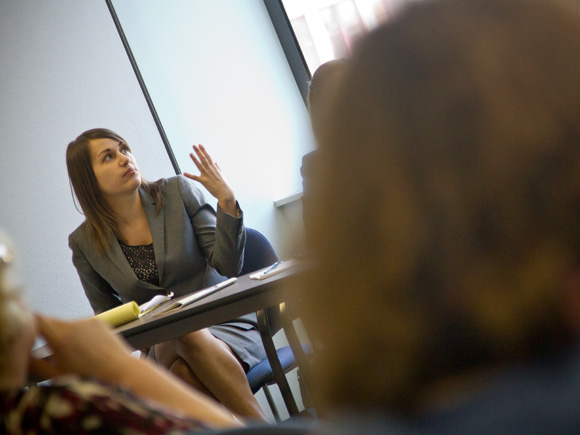When a Passion Becomes a Calling
 Lisa Krestynick, '13
Lisa Krestynick, '13
The universe can seem like a random place, but not so much for Lisa Krestynick, whose career path features footsteps that flow seamlessly from one to the next.
After graduating from college, Krestynick worked briefly in human resource administration, an experience that piqued a curiosity about legal obligations that exist between employers and employees.
That interest led Krestynick directly to law school, where she landed a co-op placement that would give her experience handling employment law. Among the projects Krestynick handled through her placement with the Civil Division of the U.S. Attorney’s Office in the Eastern District of Pennsylvania was an employment discrimination case.
Krestynick played a key role on the team tasked with defending the U.S. Department of Housing and Urban Development against an employee’s claims, gaining tremendous experience by writing motions filed with the court and preparing a witness for trial.
Krestynick said she felt well prepared for the realities she faced in legal practice, having taken courses like Pretrial Advocacy, Evidence and Litigation Drafting.
“I’ve been able to apply that knowledge in a practical setting under a lot of pressure,” she said, adding that the hands-on experience gave her insights into the enormous amount of planning and organizing that goes into the litigation process.
The co-op placement allowed Krestynick to make practical use of a paper she’d written in her Contract Theory class, exploring a question about the rights of job applicants.
While many workers must sign waivers agreeing to arbitrate disputes with employers rather than going to court, Krestynick questioned in her paper whether job applicants can really waive those rights.
“You agree to arbitrate every single claim when you’re employed, before you even have an interview,” she said. “Can you really consent to arbitrate those claims if you don’t even know you’ll be hired?”
The paper tapped into Krestynick’s strengths as a writer, while her co-op placement enabled her to translate her passion for the subject into a panel presentation she gave in April 2013 to U.S. government attorneys who sought continuing education credits.
Her supervisor, Assistant U.S. Attorney Veronica Finkelstein, said the presentation was consistent with Krestynick’s effort in the semester-long placement.
“She’s been acting as a part of our legal team,” Finkelstein said. “She’s terrific. I feel very strongly about the Drexel program. They have sent us the best students. We have had had across-the-board success.”